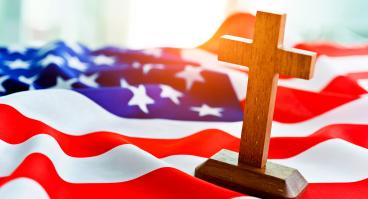Texas’ Christian Nationalists Respond to COVID-19: March Through July 2020

Table of Contents
Author(s)
To access the full paper, download the PDF on the left-hand sidebar.
Introduction
The COVID-19 pandemic has presented governments at all levels in the U.S. with perhaps their most severe public policy crisis other than wartime. January 2020 saw the first known U.S. case of COVID-19; the first known death from the disease occurred the following month. By November 10, over 10 million Americans had contracted the disease and more than 237,000 had died—a death total far exceeding battle deaths from World War I, the Korean War, and the Vietnam War combined; just over 18,000 of these COVID-19 fatalities were Texans. Across the nation, businesses closed, unemployment surged past 14%, and the gross domestic product plunged by an annual rate of nearly 33% in a single quarter.
As if all this were not bad enough, the disease and the often-disorganized government response to it served to further roil an already polarized populace. Angry debates erupted over face coverings, business and worship center lockdowns, government financial aid, and even the dangers of COVID-19 itself. As Perry, Whitehead, and Grubbs note, the pandemic “quickly ... became absorbed into partisan culture wars”; those on the left favored precautionary measures such as shutdowns and wearing masks, while many conservatives questioned the severity of the pandemic and attacked precautionary measures as government overreach and assaults on personal liberty.
Perry, Whitehead, and Grubbs also find that right-wing opposition to precautionary measures was undergirded by adherence to Christian nationalism. This ideology, also known as Christian Americanism,* consists of two related claims: that America’s founders intended that the nation be guided by Christian beliefs and that Christian teaching should again govern law and public policy today.
This report examines how prominent Christian nationalists in Texas responded to this crisis in the critical first five months of the pandemic, March through July 2020, in which the state moved from lockdowns to reopening and then back to partial lockdowns after a spike in cases. The focus is on those lawmakers and activists profiled in my March 2020 Baker Institute report, Christian Americanism and Texas Politics since 2008. At the center of the story is Texas Governor Greg Abbott, the highest-ranking Christian nationalist in state government, who has, since March 31, led the state’s response to the pandemic. During the pandemic, Abbott has been both a champion of the Christian nationalist agenda and the target of attacks by his fellow Christian nationalists. On the one hand, Abbott used the pandemic as an opportunity to ban most abortions in the state, a longtime Christian nationalist goal, and to carve out religious exemptions that seem to have mainly benefited conservative Christian congregations. On the other hand, the governor’s attempts to control the spread of the virus ignited a revolt within the Christian nationalist movement in Texas, a revolt marked by the distrust of science that Perry, Whitehead, and Grubbs find among Christian nationalists nationally.
After a brief summary of the governmental actions to curb COVID-19 in Texas, this study examines three key aspects of the Christian nationalist response to the crisis: Abbott’s abortion ban; conflicts over precautionary measures; and the Christian nationalist response to the mainstream science underpinning those measures. As of this writing (November 10, 2020), the crisis is still ongoing, debates over the proper response to it continue to rage in Texas, and the conclusions presented here are therefore subject to revision.



